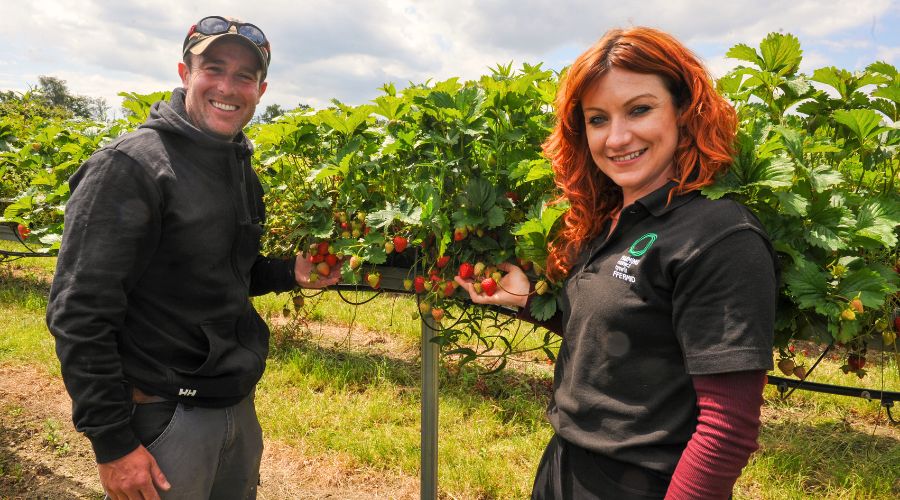Welsh fruit grower looks for effective biological control against insect pest
15th July 2024
A Welsh soft fruit grower who once lost his entire strawberry harvest to an insect pest is establishing colonies of a predatory bug in the crop before and during the flowering stage in a bid to find an effective biological control alternative to spraying with an insecticide.

Western flower thrips (WFT) and several other thrips species, including rose thrips, rubus thrips, onion thrips and flower thrips, are the nemesis of strawberry growers, and no more so than at Bellis Brothers at Holt, near Wrexham, where thrips wiped out a crop worth £25,000 three years ago.
Manager Adrian Marks said that even when chemical controls are applied, the business loses an average of five to 10% of its outdoor-grown strawberry fruit to thrips in any given year.
Alternative and more environmentally friendly thrips controls are therefore urgently needed, particularly as WFT is widely resistant to insecticides, while resistance has also occurred in onion thrips.
Farming Connect ‘Try Out Fund’
There are also concerns that other thrips species that damage strawberries could build up resistance in the future.
With funding from the Farming Connect ‘Try Out Fund’, Mr Marks is now working with experts from the agricultural and horticultural consultancy, ADAS, to work out if a predatory bug, Orius laevigatus, could be a reliable weapon against future thrips invasions.
Jude Bennison and Andy Gladman, research entomologists at ADAS, and adviser Chris Creed, joined Mr Marks at a recent Farming Connect event at Bellis Brothers, where other growers had an opportunity to see the trial in action.
One of the obstacles to introducing Orius predators into the 60-day strawberry crops at Bellis Brothers is the plant’s short flowering period, which can prevent Orius colonies from establishing and building up sufficient numbers before adult thrips fly in and attack during flowering.
To help overcome this, alyssum, a potential trap plant for thrips and a ‘banker plant’ for Orius, was planted as a companion crop in the strawberry crop.
Alyssum was planted, and Orius was released onto it several weeks before the strawberries flowered, aiming to provide the Orius with an early source of pollen to feed on to allow it to establish in sufficient numbers to control thrips as they fly in.
Rolled out on bigger scale
“The Orius for the trial were provided free of charge by Biobest UK Limited, a commercial biological control company,’’ Ms Bennison explained.
As the strawberries come into flower, the hope is that the predators will move onto them and prevent fruit damage.
The researcher added: “Another biological control agent, a predatory mite, can be effective on strawberries, but they only consume thrips larvae.
“The mite is effective against WFT, which produces large numbers of larvae in strawberry flowers, but the other species of thrips that fly in as adults do not seem to produce many larvae on strawberry, so Orius is a better option as it will prey on the adults as well as larvae.’’
If the principle behind the trial can be proven, it could be linked to a bigger project and rolled out on a bigger scale, said Dr Gladman.
At Bellis Brothers, four acres of strawberries are grown on tabletops with a sequential planting system extending the fruiting period for up to eight weeks.
The experts explained that because the fruit is grown outdoors for pick-your-own (PYO), it is more of a challenge to use Orius than in polytunnel or glasshouse crops as it needs warm temperatures to lay eggs and develop.
The cool, wet weather during May and early June this year was not ideal for Orius.
Proven biological controls
Mr Marks, who runs the business with his wife, Lizzie, and her parents, Roger and Joan Bellis, said his goal is to manage pests and diseases without relying on chemicals and the negative implications of these for the environment and beneficial organisms.
He added: “We hope that these entomologists can work their magic so that we have proven biological controls that can be effective on outdoor-grown strawberries. It is why we applied to take part in this trial.’’
Mr Creed also recommends encouraging wild predators, which can be more tolerant to pesticides within integrated pest management (IPM) programmes than commercially available predators.
This could mean introducing or allowing the growth of other companion plants, such as nettles in the hedgerows, which provide habitat and food for predators.
He advised that regular crop inspections should be carried out throughout the growing season.
Mr Creed added: “Either monitor the crops yourself or use an agronomist. There should be a lot of crop walking and checking and making key decisions.”
Many horticulture businesses are moving towards IPM, only using chemical controls when absolutely necessary.
Farming Connect horticulture sector officer Hannah Norman said the results of the trial at Bellis Brothers will be shared with other growers once the project concludes.
She added: “The Try Out Fund allows growers and farmers opportunities to be innovative and to trial different ways of doing things.
“With the Sustainable Farming Scheme on the horizon, it encourages the industry to look at alternatives and, in the case of this trial, to examine sustainable practices that might be beneficial to them and the environment.’’
Read more fruit news.
